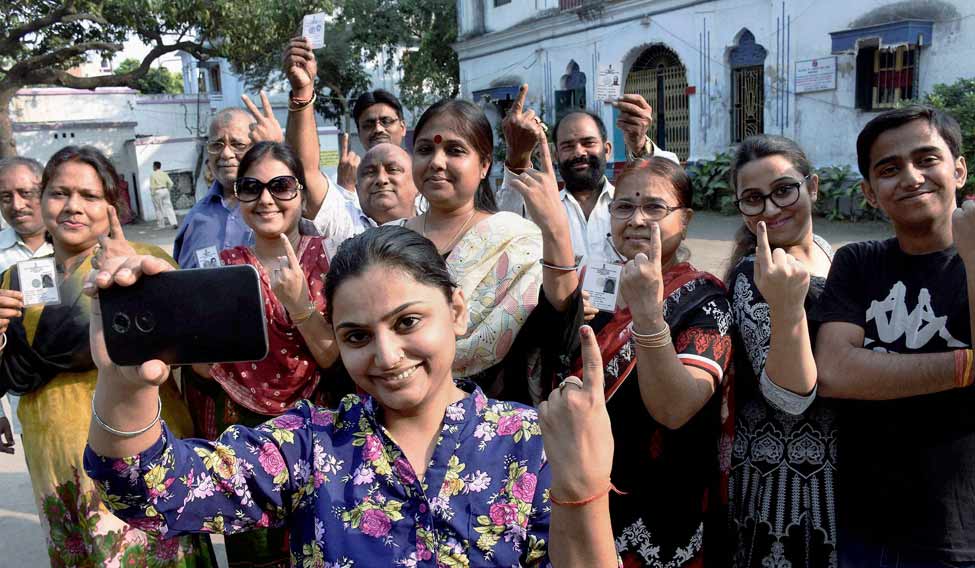After testing success in implementing the one nation one tax move for a common goods and services tax, Narendra Modi is keen to implement his another national pet project—holding simultaneous elections for Lok Sabha and all state assemblies.
The prime minister has tasked the law ministry under his senior colleague Ravi Shankar Prasad to work out the strategies on implementing One Nation One Election in 2019. The Election Commission has already announced it is ready to hold the common elections, as it has enough extra electronic voting machines. The additional staff required for conducting the joint elections is available with central and state governments. No extra security personnel will be required for this exercise.
Modi has adopted the pet idea of Bharatiya Jana Sangh and later the Bharartiya Janata Party that full assured term for Lok Sabha and state assemblies will eliminate regional parties, and allow two strong national parties—one of them rightist and another leftist—to compete for control of both the states and the central government. Jana Sangh president Balraj Madhok strongly articulated this demand, and when Atal Behari Vajpayee became the first prime minister from the rightist camp, he had even set up a constitutional review commission, one of whose tasks was to recommend how elections can be held together, which was the practice in the first two general elections held in 1952 and 1957. but after the fall of the EMS Namboodaripad government in Kerala, followed by the fall of coalition governments in 1960s and 1970s, the pattern changed, and even Lok Sabha could not complete its term four times due to political instability.
The commission headed by former chief justice M.N. Venkatachallaiah had said the simultaneous elections would have several advantages including political stability, reduction of money power in elections and end the defection menace.
Unlike the 'one nation one tax' concept in which all parties which are in power in different states were partners, Modi has no takers outside the national democratic alliance. While the Shiv Sena has opposed the move, Modi's new ally Nitish Kumar has not opened his mouth so far on the proposal. Similarly, Telugu Desham Party leader Chandrababu Naidu, who supports Modi, has not publicly come out in support. Even the GST took seven years of work between the Union finance minister and his counterparts in all the states to become a reality. Election Commissioner O.P. Rawat has been frank that the idea will work only if there is complete political consensus. But the congress and ruling regional parties like Trinamool Congress, AIADMK, CPI(M) and Aam Aadmi Party are not in favour of simultaneous elections.
Experts in the law ministry say the best option would be to amend the constitution, as the proposal is linked to the federal structure. The constitution has treated Lok Sabha and state assemblies as distinct entities, and has made separate provisions for their composition, constitution and dissolution, while holding that the prime minister or the chief minister will be accountable to having majority to the house concerned. changing the system means that the full five year term of the Lok Sabha and assemblies becomes non-negotiable, even if there is a split in the ruling party or break up of the ruling coalition. If a government falls, then one option is that the prime minister or chief minister who lost majority will continue till a successor is elected by the Lok Sabha or assembly.
The second option for states will be a long spell of president's rule while keeping the assembly in suspended animation, without the option of dissolution for taking a fresh mandate before the five year term ends. This would require a major amendment which needs to be passed by both houses of parliament as well as all state assemblies, since it would be an amendment to the basic structure of the constitution.
This would require tortured negotiation as the government does not have majority in Rajya Sabha, and does not control major assemblies like West Bengal, Tamil Nadu, Karnataka, Telengana, Kerala, Odisha and Punjab at present, especially if Modi wants simultaneous elections in 2019 when his current term ends. The other option is to use the absolute power of the state governors to dissolve the assemblies which still have a tenure left and go for polls. but this would be an unpopular step, which can have political backlash in the opposition ruled states, and also will be challenged strongly in the Supreme Court. No chief minister would like to have his tenure curtailed just because of the ruling party's push for common elections. even Adityanath in Uttar Pradesh, who enjoys a sledge hammer majority would not like his term cut short by three years, and subject himself to the electorate's mercy before the due date. But the idea is out of the bag, and Modi is a man who thinks he should take big risks like demonetisation regularly, even if the move hastens opposition unity.





